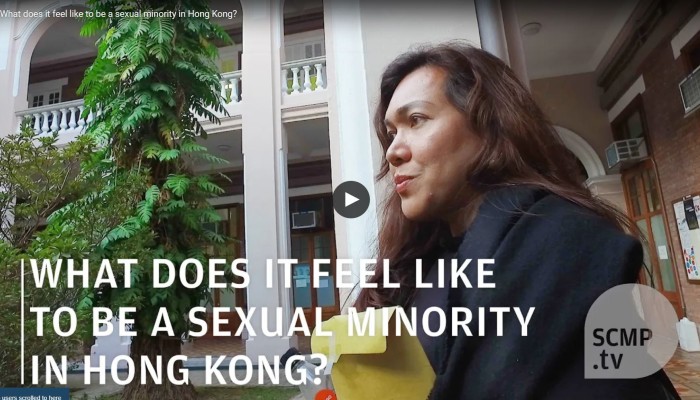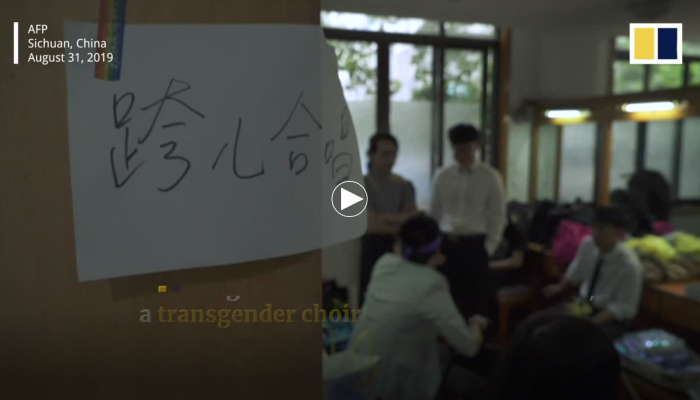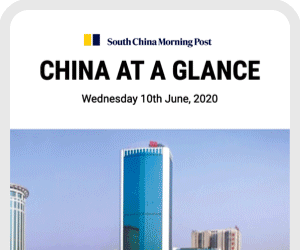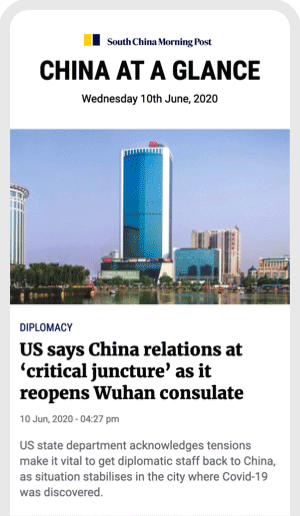Hello again, Global Impact Readers,
China decriminalised homosexuality in 1997 before removing it from an official list of mental disorders four years later.
For the estimated 70 million Chinese people who identify as LGBT, there was already a significant pushback against lesbian, gay, bisexual and transgender rights, even before the community was caught up in a recent round of repression that targeted various sectors, including education and online platforms.
This has included the banning of gay themes in film and TV and specific targeting of individual activists and groups, leaving 5 per cent of China’s population feeling under pressure on a number of fronts.
This week, Robert Burton-Bradley, a production editor with the SCMP’s People & Culture desk, is on hand to explain what it all means.
Best,
Andrew Mullen
Production Editor, Political EconomyLGBT community in sights as China cracks down on ‘Western import’
What began as an assault on the growing influence of China’s tech giants last year has widened to include a wide swathe of Chinese society, with LGBT people increasingly targeted.
Beijing has become more and more paranoid that big tech platforms are spreading views and ideas that run counter to traditional ideals of masculinity and femininity. Authorities say they are encouraging younger people to explore new gender identities and non-traditional forms of sexual expression.
In the past, state-controlled television stations and newspapers, such as CCTV and China Daily, were the main forms of media, so the state had a firm grasp on the content being produced. But with the rise of social media and online streaming, this is no longer the case.
Despite an earlier ban in 2016 on expressions of same-sex love in film and television, such as men kissing on screen or holding hands, many tech platforms found ways around the rules to cater to the increasing popularity of gender-diverse and LGBT content.
But in February, in one of the first moves against gender identity and sexuality, China’s Ministry of Education announced new teaching methods in schools that would “cultivate masculinity” and improve schoolboys’ mental and physical health while the ministry “conducted further research”.
In July, the WeChat accounts of dozens of LGBT student organisations across China were shut down permanently in a move that took the groups by surprise, triggering anger and fear within the LGBT community.
In August, LGBT activists and groups expressed alarm when Shanghai University asked its colleges to conduct surveys into students’ “state of mind” and to investigate the political stance and psychological condition of students. Many saw this as an attempt to identify and document LGBT students.
In September, China’s top media regulator announced a boycott of what it called “sissy idols”, among other new guidelines, during an ongoing “clean-up” of the entertainment industry. This group includes pop idols who wear make-up or who do not conform to male stereotypes prevalent in traditional Chinese culture.
That same month, as part of a crackdown on gaming among China’s youth, there was a new directive banning the promotion of the “wrong set of values”, including depictions of “gay love” and “effeminate men” in video games.
According to Dr Hongwei Bao, an expert in Asian LGBT studies from the University of Nottingham in the UK, the targeting of LGBT people is part of a broader reaction, amid rising tensions with the West, that seeks to bolster nationalism and promote long-term stability.
“The pushback against the rich and the famous and the crackdown on LGBT issues reflect the current Chinese government’s unease about globalisation,” he said.
- South China Morning Post, SCMP -
Hello again, Global Impact Readers,
China decriminalised homosexuality in 1997 before removing it from an official list of mental disorders four years later.
For the estimated 70 million Chinese people who identify as LGBT, there was already a significant pushback against lesbian, gay, bisexual and transgender rights, even before the community was caught up in a recent round of repression that targeted various sectors, including education and online platforms.
This has included the banning of gay themes in film and TV and specific targeting of individual activists and groups, leaving 5 per cent of China’s population feeling under pressure on a number of fronts.
This week, Robert Burton-Bradley, a production editor with the SCMP’s People & Culture desk, is on hand to explain what it all means.
Best,
Andrew Mullen
Production Editor, Political EconomyLGBT community in sights as China cracks down on ‘Western import’
What began as an assault on the growing influence of China’s tech giants last year has widened to include a wide swathe of Chinese society, with LGBT people increasingly targeted.
Beijing has become more and more paranoid that big tech platforms are spreading views and ideas that run counter to traditional ideals of masculinity and femininity. Authorities say they are encouraging younger people to explore new gender identities and non-traditional forms of sexual expression.
In the past, state-controlled television stations and newspapers, such as CCTV and China Daily, were the main forms of media, so the state had a firm grasp on the content being produced. But with the rise of social media and online streaming, this is no longer the case.
Despite an earlier ban in 2016 on expressions of same-sex love in film and television, such as men kissing on screen or holding hands, many tech platforms found ways around the rules to cater to the increasing popularity of gender-diverse and LGBT content.
But in February, in one of the first moves against gender identity and sexuality, China’s Ministry of Education announced new teaching methods in schools that would “cultivate masculinity” and improve schoolboys’ mental and physical health while the ministry “conducted further research”.
In July, the WeChat accounts of dozens of LGBT student organisations across China were shut down permanently in a move that took the groups by surprise, triggering anger and fear within the LGBT community.
In August, LGBT activists and groups expressed alarm when Shanghai University asked its colleges to conduct surveys into students’ “state of mind” and to investigate the political stance and psychological condition of students. Many saw this as an attempt to identify and document LGBT students.
In September, China’s top media regulator announced a boycott of what it called “sissy idols”, among other new guidelines, during an ongoing “clean-up” of the entertainment industry. This group includes pop idols who wear make-up or who do not conform to male stereotypes prevalent in traditional Chinese culture.
That same month, as part of a crackdown on gaming among China’s youth, there was a new directive banning the promotion of the “wrong set of values”, including depictions of “gay love” and “effeminate men” in video games.
According to Dr Hongwei Bao, an expert in Asian LGBT studies from the University of Nottingham in the UK, the targeting of LGBT people is part of a broader reaction, amid rising tensions with the West, that seeks to bolster nationalism and promote long-term stability.
“The pushback against the rich and the famous and the crackdown on LGBT issues reflect the current Chinese government’s unease about globalisation,” he said.
|
Was this newsletter forwarded to you? Subscribe here
|

|
|
|
|
|
30 October 2021 |
|
Welcome to our 1,555 newly joined SCMP Global Impact readers who signed up in the past week.
|
|
Hello again, Global Impact Readers,
China decriminalised homosexuality in 1997 before removing it from an official list of mental disorders four years later.
For the estimated 70 million Chinese people who identify as LGBT, there was already a significant pushback against lesbian, gay, bisexual and transgender rights, even before the community was caught up in a recent round of repression that targeted various sectors, including education and online platforms.
This has included the banning of gay themes in film and TV and specific targeting of individual activists and groups, leaving 5 per cent of China’s population feeling under pressure on a number of fronts.
This week, Robert Burton-Bradley, a production editor with the SCMP’s People & Culture desk, is on hand to explain what it all means.
Best,
Andrew Mullen
Production Editor, Political Economy
LGBT community in sights as China cracks down on ‘Western import’
What began as an assault on the growing influence of China’s tech giants last year has widened to include a wide swathe of Chinese society, with LGBT people increasingly targeted.
Beijing has become more and more paranoid that big tech platforms are spreading views and ideas that run counter to traditional ideals of masculinity and femininity. Authorities say they are encouraging younger people to explore new gender identities and non-traditional forms of sexual expression.
In the past, state-controlled television stations and newspapers, such as CCTV and China Daily, were the main forms of media, so the state had a firm grasp on the content being produced. But with the rise of social media and online streaming, this is no longer the case.
Despite an earlier ban in 2016 on expressions of same-sex love in film and television, such as men kissing on screen or holding hands, many tech platforms found ways around the rules to cater to the increasing popularity of gender-diverse and LGBT content.
But in February, in one of the first moves against gender identity and sexuality, China’s Ministry of Education announced new teaching methods in schools that would “cultivate masculinity” and improve schoolboys’ mental and physical health while the ministry “conducted further research”.
In July, the WeChat accounts of dozens of LGBT student organisations across China were shut down permanently in a move that took the groups by surprise, triggering anger and fear within the LGBT community.
In August, LGBT activists and groups expressed alarm when Shanghai University asked its colleges to conduct surveys into students’ “state of mind” and to investigate the political stance and psychological condition of students. Many saw this as an attempt to identify and document LGBT students.
In September, China’s top media regulator announced a boycott of what it called “sissy idols”, among other new guidelines, during an ongoing “clean-up” of the entertainment industry. This group includes pop idols who wear make-up or who do not conform to male stereotypes prevalent in traditional Chinese culture.
That same month, as part of a crackdown on gaming among China’s youth, there was a new directive banning the promotion of the “wrong set of values”, including depictions of “gay love” and “effeminate men” in video games.
According to Dr Hongwei Bao, an expert in Asian LGBT studies from the University of Nottingham in the UK, the targeting of LGBT people is part of a broader reaction, amid rising tensions with the West, that seeks to bolster nationalism and promote long-term stability.
“The pushback against the rich and the famous and the crackdown on LGBT issues reflect the current Chinese government’s unease about globalisation,” he said.
|
|
|
|
|
|

|
|
LGBT community in sights as China cracks down on ‘Western import’
|
| • |
China’s regulatory crackdowns have targeted various sectors, including education and online platforms | | | • | LGBT people have been affected in myriad ways, from the banning of gay themes in film and TV to the specific targeting of individual activists and groups
|
|
|
On August 13 last year, the organisers of Shanghai’s long-running LGBT pride festival abruptly announced the event was being cancelled indefinitely without explanation. The news came as a shock to many as the event had run successfully, albeit quietly, for 11 years. In a brief statement on its website titled “the end of the rainbow” the organisation said: “ShanghaiPRIDE regrets to announce that we are cancelling all upcoming activities and taking a break from scheduling any future events. We love our community, and we are grateful for the experiences we’ve shared together.” Read more
|
|
|
|

|
|
|

|
|
China releases plan to ban ‘sissy idols’, promote a ‘correct beauty standard’
|
| • |
China has been cracking down on the entertainment industry in the wake of recent scandals | | | • | China’s media regulator wants traditional culture promoted, a ‘correct beauty standard’, and a boycott of ‘sissy idols’ and vulgar internet celebrities
|
|
|
China’s top media regulator has announced a boycott of what it called “sissy idols”, among other new guidelines, during an ongoing “clean up” of the entertainment industry. The authorities have been increasingly critical of the trend some refer to as “sissy men”, which include pop idols that wear make-up or who do not conform to “macho” male stereotypes prevalent in traditional Chinese culture. Some in China also see the popularity of such idols, often referred to as “little fresh meat”, as a threat to traditional social values. Read more
|
|

|
|
LGBT groups panic as China tightens rules on internet publishing
|
| • |
New rules force self-publishers, including bloggers and social media users, to apply for an official licence to publish current affairs content | | | • | The rules have raised concerns within the LGBT community that organising anything on behalf of LGBT rights could violate them
|
|
|
China’s LGBT communities are reeling over new internet self-publishing rules they claim will remove the last vestiges of free expression they have. The new rules apply to everyone in China and force self-publishers to apply for an official licence to publish current affairs content. Read more
|
|

|

|
|
|

|
|
‘Room for improvement’: China’s record on LGBTQ rights
|
| • |
Same-sex couples can become each other’s legal guardians, a status similar to a civil union, in China, annual ILGA World report notes | | | • | ‘China’s situation isn’t the worst in Asia, but it still has room for improvement,’ Xin Ying, executive director of the Beijing LGBTQ Centre, says
|
|
|
In China, homosexuality was decriminalised in 1997. Previously, consensual sexual acts between people of the same sex were considered “hooliganism”, with punishments ranging from imprisonment to execution. However, China still offers no protection or recognition of the lesbian, gay, bisexual, transgender, and queer (LGBTQ) community, a new report says. Although same-sex marriage is not legal, Chinese couples have found other ways to gain some legal protection, the global progress report on LGBTQ rights by the International Lesbian, Gay, Bisexual, Trans and Intersex Association (ILGA World) said. Read more
|
|
|
To keep track of the latest global news developments, follow daily coverage on our website or focus on stories about LGBT people here.
In our next issue, our China desk will take a look back at the G20 meeting which is taking place in Rome, Italy, this weekend.
We welcome your feedback. Email me at globalimpact@scmp.com or tweet me at @R_BurtonBradley. Plus, be sure to check out our news feed for the latest news and analysis on China’s People and Culture.
All the best,
Robert Burton-Bradley
|
|
Robert Burton-Bradley
Production Editor, People & Culture
|
|
|
|
|
|
| SCMP NEWSLETTERS THAT MAY INTEREST YOU |

China at a Glance
A wealth of insights giving you the inside story on China every day.
China Economic Update
The latest developments from trade relations to growth rates and other key economic data.
Inside China Tech
Our weekend newsletter covering the biggest stories and updates from the tech centres of China.
VIEW AND SIGN UP
|

|
|
|
Download our app
To get push notifications direct and never miss a story as it breaks
|
|
|
|
|
Hong Kong
China
Asia
World
Economy
Business
Tech
Comment
|
|
|
|
This email was sent to [email]
unsubscribe from this list
update subscription preferences
South China Morning Post Publishers Ltd · 19/F Tower 1 · 1 Matheson Street · Hong Kong · Hong Kong
Copyright © 2021 South China Morning Post Publishers Ltd. All rights reserved.
|













